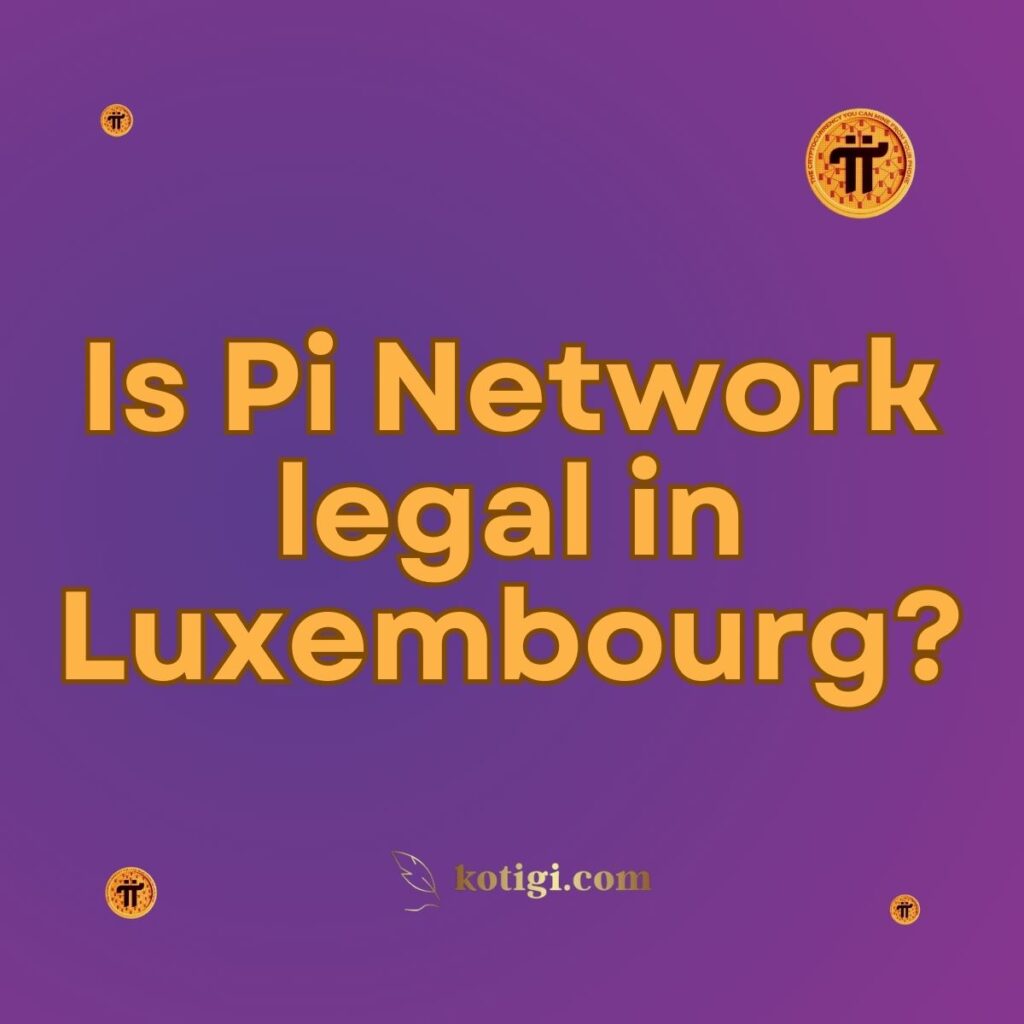
Is Pi Network legal in Luxembourg?
Yes, Pi Network is legal in Luxembourg, as it operates within the general legal framework for cryptocurrencies. However, like most countries, Luxembourg has its own regulations concerning cryptocurrency activities, particularly regarding anti-money laundering (AML) and know-your-customer (KYC) policies. Pi Network’s compliance with these policies ensures its operations align with local requirements.
Introduction
Pi Network, a decentralized cryptocurrency project, has gained global attention, including in Luxembourg. As a pioneer in mobile mining, Pi Network allows users to mine Pi coins from their smartphones. With growing adoption, users in Luxembourg may wonder whether Pi Network’s operations and involvement comply with local laws and regulations.
In Luxembourg, cryptocurrency activities are generally legal, but they must adhere to certain regulations to ensure transparency and avoid financial crime. This article explores Pi Network’s legal standing in Luxembourg, examining the country’s cryptocurrency regulations and how Pi Network fits within them.
1. Overview of Luxembourg’s Cryptocurrency Regulations
1.1 Legal Framework for Cryptocurrencies in Luxembourg
Luxembourg is known for its favorable stance toward digital innovation, including cryptocurrencies. The country has established a regulatory framework that allows cryptocurrencies to operate legally, provided they comply with specific financial laws and guidelines. These include requirements related to anti-money laundering (AML) and combating the financing of terrorism (CFT).
1.2 Regulatory Authorities
In Luxembourg, the Commission de Surveillance du Secteur Financier (CSSF) is the financial regulatory authority responsible for overseeing cryptocurrency activities. The CSSF ensures that crypto-related businesses and projects comply with relevant regulations, such as AML and KYC laws, to maintain the integrity of the financial system.
1.3 Key Requirements for Crypto Operations
Cryptocurrency platforms operating in Luxembourg must follow strict rules to prevent illicit activities. This includes implementing robust AML and KYC processes to identify and verify users. Pi Network adheres to these regulations through its own KYC process, ensuring that users are properly verified and the platform remains compliant.
2. How Pi Network Complies with Luxembourg’s Laws?
2.1 Pi Network’s KYC Process
Pi Network incorporates a comprehensive know-your-customer (KYC) verification system that aligns with Luxembourg’s legal requirements. By verifying users’ identities, Pi Network ensures that it operates within the bounds of the law, particularly concerning anti-money laundering measures.
2.2 AML Compliance
Luxembourg’s anti-money laundering laws are stringent, requiring all financial entities, including cryptocurrency projects, to implement measures that prevent money laundering and illegal financial activities. Pi Network’s KYC and transaction monitoring tools help to mitigate risks of financial crimes and ensure the network complies with AML regulations in Luxembourg.
2.3 User Data Protection
Luxembourg adheres to the General Data Protection Regulation (GDPR), which mandates strict data privacy and protection rules. Pi Network ensures that user data collected during the KYC process is handled securely and in accordance with GDPR standards, further solidifying its legal standing in the country.
3. Benefits of Pi Network in Luxembourg
3.1 Increased Adoption of Blockchain Technology
Luxembourg has been actively promoting the adoption of blockchain technology, and Pi Network’s mobile-friendly mining model fits well within this vision. Its decentralized nature and user-friendly interface make it accessible to a wider audience, promoting the use of blockchain technology among the general population.
3.2 Contribution to Financial Inclusion
Pi Network’s low-entry mining model provides an opportunity for individuals in Luxembourg, particularly those with limited access to traditional banking services, to participate in the cryptocurrency economy. This aligns with the broader European goal of promoting financial inclusion through technology.
3.3 Opportunities for Developers
Luxembourg’s blockchain-friendly environment creates opportunities for developers to build applications and services around Pi Network. The platform’s open-source development approach allows developers to contribute to its ecosystem, creating a synergy between Pi Network’s goals and Luxembourg’s innovation-driven economy.
4. Challenges Pi Network Faces in Luxembourg
4.1 Regulatory Uncertainty
Although Luxembourg is relatively open to cryptocurrencies, the regulatory environment is still evolving. Pi Network, like other cryptocurrencies, faces the challenge of adapting to potential changes in laws and regulations as the country continues to refine its approach to digital currencies.
4.2 Ensuring Long-Term Compliance
As the network expands and its user base grows, Pi Network must continuously update its compliance measures to ensure that it remains aligned with Luxembourg’s evolving regulations. This includes staying current with any changes to AML and KYC laws and implementing necessary adjustments.
4.3 Public Perception
Public understanding of Pi Network and cryptocurrencies in general can vary. While Pi Network is legal, educating the public about its compliance with local regulations and the benefits it offers may help to improve its adoption and acceptance in Luxembourg.
5. Comparison to Other Cryptocurrencies in Luxembourg
5.1 Bitcoin and Ethereum
Pi Network’s mobile mining model sets it apart from more established cryptocurrencies like Bitcoin and Ethereum, which require energy-intensive mining operations. In Luxembourg, Bitcoin and Ethereum are widely used, but their energy consumption and environmental impact have raised concerns, making Pi Network a more sustainable alternative.
5.2 Legal Standing
Like Pi Network, Bitcoin and Ethereum are legal in Luxembourg, provided they comply with local regulations. However, Pi Network’s focus on accessibility and mobile-friendly mining gives it an edge in terms of broader user adoption in Luxembourg’s regulatory framework.
5.3 Adoption Rates
While Bitcoin and Ethereum have a larger user base globally, Pi Network’s rapid growth and innovative mining process could position it as a strong competitor in Luxembourg’s cryptocurrency landscape. Its emphasis on decentralization and user participation appeals to a different segment of the market.
6. Future of Pi Network in Luxembourg
6.1 Regulatory Developments
As Luxembourg continues to refine its approach to cryptocurrencies, Pi Network may benefit from clearer guidelines and increased support for blockchain projects. Ongoing dialogue between regulators and cryptocurrency platforms could further enhance Pi Network’s legal standing and promote its growth in the country.
6.2 Potential for Partnerships
Pi Network’s decentralized model opens the door for potential partnerships with local businesses and developers in Luxembourg. By collaborating with local entities, Pi Network can enhance its integration into the Luxembourg financial ecosystem and expand its reach.
6.3 Expansion of Pi Ecosystem
The continued expansion of Pi Network’s ecosystem, including the development of decentralized applications (dApps), could provide additional opportunities for growth in Luxembourg. As more users and developers engage with the platform, Pi Network’s presence in the country could solidify, further strengthening its legal standing.
7. User Experience in Luxembourg
7.1 Accessibility
Pi Network’s mobile app is easily accessible to users in Luxembourg, making it convenient for people to participate in cryptocurrency mining without the need for specialized hardware. This user-friendly approach aligns with Luxembourg’s focus on innovation and digital accessibility.
7.2 Security Features
Pi Network’s commitment to security, including its robust KYC process and data protection measures, ensures that users in Luxembourg can engage with the platform safely and confidently. This is crucial for maintaining trust in the network and ensuring compliance with local regulations.
7.3 Community Engagement
Pi Network’s active community-building efforts allow users in Luxembourg to connect with a global network of participants. This fosters a sense of collaboration and shared purpose, further enhancing the user experience and contributing to the platform’s growth.
Conclusion
Pi Network operates legally in Luxembourg, adhering to the country’s regulations concerning cryptocurrencies. Its compliance with AML and KYC policies, coupled with its commitment to data protection under GDPR, ensures that it remains within the bounds of Luxembourg’s legal framework. While Pi Network faces challenges related to regulatory uncertainty and public perception, its innovative approach to mobile mining and its alignment with Luxembourg’s digital innovation goals position it well for continued growth in the country.
Key Takeaways:
- Pi Network is legal in Luxembourg and complies with local cryptocurrency regulations.
- The platform’s KYC and AML measures align with Luxembourg’s legal requirements.
- Pi Network’s user-friendly mobile mining model promotes financial inclusion.
- Challenges include regulatory uncertainty and the need for public education.
- Pi Network has the potential to expand and collaborate with local developers and businesses in Luxembourg.





